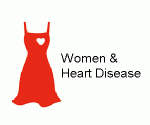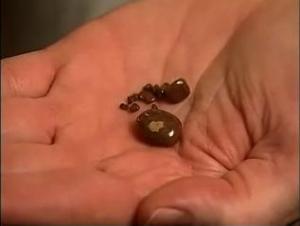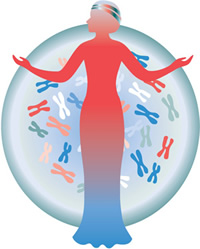 In celebration of Women's Heart Month, the Institute for Women's Health Research featured heart disease in women in its February E-newsletter. To view this free newsletter, click Heart Disease in Women Enewsletter.
In celebration of Women's Heart Month, the Institute for Women's Health Research featured heart disease in women in its February E-newsletter. To view this free newsletter, click Heart Disease in Women Enewsletter.
 Women taking a low dose of the antidepressant escitalopram had fewer and less severe hot flashes than those taking a placebo, a new clinical trial reports.
Women taking a low dose of the antidepressant escitalopram had fewer and less severe hot flashes than those taking a placebo, a new clinical trial reports.
Menopause is a transition that affects many women as they approach age 50. It marks the end of menstrual periods and fertility. It can also bring hot flashes, trouble sleeping, mood changes and other symptoms.
Menopausal hormone therapy has long been the predominant treatment for menopausal symptoms. However, its use has greatly declined since 2002, when a large NIH-funded study concluded that the overall risks of menopausal hormone therapy likely outweigh the benefits in certain groups of women.
No other treatments for menopausal hot flashes currently have FDA approval. Recent studies suggest that certain anti-depressant medications may be effective for relieving hot flashes, but the results have been inconclusive.
Dr. Ellen W. Freeman at the University of Pennsylvania School of Medicine and her colleagues enrolled over 200 healthy menopausal or postmenopausal women. The women were given either a daily dose of escitalopram or a placebo for 8 weeks. The researchers tracked the number, severity and irritation of their hot flashes. The trial was funded by NIH’s National Institute on Aging (NIA) and several other NIH components.
As described in the January 19, 2011, issue of the Journal of the American Medical Association the researchers found that women taking escitalopram had an average of nearly 50% fewer hot flashes after 4 weeks. In comparison, women taking the placebo had on average of 26% fewer hot flashes. The escitalopram treatment led to even further reductions in hot flashes after 8 weeks. Women taking the medication also reported a reduction in the severity and bother of their hot flashes.
An equal number of white and African American women participated in the study. Race had no significant effect on the treatment results.
While it is not clear exactly why antidepressants like escitalopram are effective for treating hot flashes, the study shows that these drugs could be a safe alternative to hormone therapy. Women taking escitalopram reported few adverse side effects during or after the clinical trial. Furthermore, a majority of the women said they were satisfied with the treatment and would like to continue taking escitalopram.
"Our findings suggest that among healthy women who were not depressed or anxious, a 10 to 20 milligram dose of escitalopram provides a non-hormonal, off-label option that is effective and well-tolerated in the management of menopausal hot flashes," Freeman says.
Source: National Institutes of Health
 Due to the blizzard expected in Chicago today, Hot Flash Havoc ---a film of menopausal proportions, will be rescheduled at Northwestern University and be shown on Thursday night, February 3. The award winning film will be followed by a panel of experts from Northwestern who will be available to answer all your questions about menopause. To register for the event, click HERE and go to ' buy tickets' $25 includes the film, parking, panel discussion and red boa reception!
Due to the blizzard expected in Chicago today, Hot Flash Havoc ---a film of menopausal proportions, will be rescheduled at Northwestern University and be shown on Thursday night, February 3. The award winning film will be followed by a panel of experts from Northwestern who will be available to answer all your questions about menopause. To register for the event, click HERE and go to ' buy tickets' $25 includes the film, parking, panel discussion and red boa reception!
Hot Flash Havoc, a film on menopause, will be presented on February 2, 2011 in Chicago. A panel of experts and a reception follow the film. Click HERE.for information.
 Young women with the menopause-like condition, primary ovarian insufficiency, are much more likely than other women to experience depression at some point during their lives, according to a study from the National Institutes of Health. The finding suggests that all women diagnosed with the condition should be evaluated for depression.
Young women with the menopause-like condition, primary ovarian insufficiency, are much more likely than other women to experience depression at some point during their lives, according to a study from the National Institutes of Health. The finding suggests that all women diagnosed with the condition should be evaluated for depression.
Depression is a serious medical illness affecting the brain which involves more than feeling blue or sad for a few days. Symptoms include persistent feelings of sadness, difficulty sleeping or over sleeping, energy loss, and feelings of worthlessness.
Primary ovarian insufficiency, or POI, results in a menopause-like condition years before normal menopause begins — sometimes as early as the teens or twenties. Women with POI stop producing normal amounts of reproductive hormones, develop hot flashes, and typically become infertile. The study authors evaluated 174 women with POI and found that 67 percent either were currently clinically depressed or had been depressed at least one time in their lives.
The researchers noted that this proportion was more than twice the rate of depression found by a national survey of women in the general population.
"Because of the strong association with depression, our results indicate all women diagnosed with POI should be thoroughly evaluated for depression," said Lawrence M. Nelson, M.D., co-senior author of the study and head of the Integrative and Reproductive Medicine Group at the NIH’s Eunice Kennedy Shriver National Institute of Child Health and Human Development (NICHD). "Simply asking patients if they are depressed is not sufficient. Primary care physicians should evaluate their patients with a diagnostic screening test to determine if treatment or referral to a mental health specialist for further evaluation is needed."
The study's first author was Peter J. Schmidt, M.D., of the National Institute of Mental Health (NIMH). The study appears in The Journal of Clinical Endocrinology and Metabolism.
The study was unable to determine why women with POI are more likely than other women to experience depression. The investigators cited results of a previous study, which had suggested that depression might trigger physical changes that ultimately lead women to develop POI. However, in the current study, more than 73 percent of women with POI first experienced depressive symptoms after developing the irregular menstrual cycles believed to be an indicator of impending POI.
The findings also did not support the hypothesis that most women with POI become depressed after they are told of their diagnosis, when they learn that they will likely be infertile. In the current study, more than 68 percent of patients with POI who had depression had become depressed after the onset of irregular menstrual cycles, but before receiving the diagnosis of POI.
In a previous study, Dr. Schmidt found that women entering natural menopause at an appropriate age are at greater risk of depression late in the menopause transition, when estrogen levels are particularly low.
"Future studies are needed to help determine whether hormonal changes, perhaps combined with a particular genetic makeup, might predispose some women to depression," said Dr. Schmidt.
The authors also noted that studies of women undergoing natural menopause have found that estrogen supplements relieve symptoms of depression in some women. The authors added that it is possible that estrogen supplements might relieve symptoms of depression in women with POI.
NIMH provides information about women and depression in its booklet Women and Depression: Discovering Hope.
 The first research from the Breakthrough Generations Study could lead to a test to predict a woman's reproductive lifespan.
The first research from the Breakthrough Generations Study could lead to a test to predict a woman's reproductive lifespan.
The findings, published in Human Molecular Genetics, could have considerable impact on women in the United Kingdom (UK) and other western countries, where many start having children at a later age. Early menopause affects one in 20 UK women.
The study from scientists at the University of Exeter Peninsula Medical School and The Institute of Cancer Research (ICR), funded by The Wellcome Trust, tested four genes associated with the menopause. They compared 2,000 women from the Breakthrough Generations Study who had experienced early menopause with a matched group of the same number. The four genes each affected risk of early menopause. In combination, they had a larger impact, which goes towards explaining why some women experience early menopause.
The Breakthrough Generations Study is a large and comprehensive study into the causes of breast cancer and a partnership between Breakthrough Breast Cancer and the ICR. The study will follow the 100,000 UK women participants for the next 40 years to unravel the lifestyle, environmental and genetic factors that cause the disease.
Although early menopause is associated with a decreased risk of breast cancer, women who experience early menopause are susceptible to other health problems including osteoporosis, cardiovascular disease and a reduction in fertility.
The research could help women determine whether they have a genetic predisposition to early menopause, and therefore predict the time of the end of their reproductive life. They could then make informed family planning decisions on the basis of this knowledge.
Lead scientist Dr Anna Murray, from the University of Exeter Peninsula Medical School, says, "It is estimated that a woman's ability to conceive decreases on average ten years before she starts the menopause. Therefore, those who are destined to have an early menopause and delay childbearing until their 30s are more likely to have problems conceiving.
"These findings are the first stage in developing an easy and relatively inexpensive genetic test which could help the one in 20 UK women who may be affected by early menopause."
Source: Hum Mol Genet. 2010 Oct 26. [Epub ahead of print]
 Menopause and the appropriate way to handle symptoms continues to be a lively topic of conversation. Much of this discussion is based on findings from the landmark Women's Health Initiative Trial that was launched in 1991 and consisted of a set of clinical trials and an observational study, which together involved 161,808 generally healthy postmenopausal women. The clinical trials were designed to test the effects of postmenopausal hormone therapy, diet modification, and calcium and vitamin D supplements on heart disease, fractures, and breast and colorectal cancer. The initial studies were closed in 2002 when the risks of hormone replacement therapy appeared to outweigh the benefits, though this led to a round of controversy about the study design and the age of the study subjects that continues today. As a result, the data from this huge study continues to be explored and new conclusions drawn.
Menopause and the appropriate way to handle symptoms continues to be a lively topic of conversation. Much of this discussion is based on findings from the landmark Women's Health Initiative Trial that was launched in 1991 and consisted of a set of clinical trials and an observational study, which together involved 161,808 generally healthy postmenopausal women. The clinical trials were designed to test the effects of postmenopausal hormone therapy, diet modification, and calcium and vitamin D supplements on heart disease, fractures, and breast and colorectal cancer. The initial studies were closed in 2002 when the risks of hormone replacement therapy appeared to outweigh the benefits, though this led to a round of controversy about the study design and the age of the study subjects that continues today. As a result, the data from this huge study continues to be explored and new conclusions drawn.
Just this week, two blogs came across my desk that I thought were well written and worth sharing. The first came from CNN (click HERE) and provides a comprehensive look at the background and questions that surround this issue. The second is a blog (click HERE) from the Loyola University Health System that addresses concerns that women just entering perimenopause have with some quick suggestions to ease the way.
Enjoy and let me know if you found them helpful!
 Researchers at the University of Texas Southwestern Medical Center report that estrogen therapy after menopause increases a woman's chances of developing kidney stones. Kidney stones are common among postmenopausal women, affecting between 5% and 7% of the population in the U.S. Up until now, only observational studies have been done looking at kidney stones and estrogen, and the results have been conflicting. This study shows new evidence based on a randomized, placebo-controlled trial.
Researchers at the University of Texas Southwestern Medical Center report that estrogen therapy after menopause increases a woman's chances of developing kidney stones. Kidney stones are common among postmenopausal women, affecting between 5% and 7% of the population in the U.S. Up until now, only observational studies have been done looking at kidney stones and estrogen, and the results have been conflicting. This study shows new evidence based on a randomized, placebo-controlled trial.
Lead study author, Dr. Naim Maalouf and colleagues conducted trials at 40 U.S. clinical centers where a total 10,739 post-menopausal women with hysterectomies and 16,608 post-menopausal women without hysterectomies were randomized to receive either an estrogen supplement or a placebo. Among those receiving hormones, 335 cases of kidney stones were reported versus 284 cases in the placebo groups. In general, kidney stones are less common among pre-menopausal women than among men in the same age group, but the disparity lessens after menopause, suggesting that estrogen may have a protective effect.
However, study lead author Maalouf points out the study challenges the belief estrogen may protect against kidney stones. "This research suggests that the opposite might be true, and it offers new information that might be considered when prescribing estrogen-replacement therapies to post-menopausal women," Maalouf says in a statement.
The study did not detect any link between kidney stone risk and body mass index, age, prior hormone therapy, coffee usage, diuretic usage, or ethnicity.
The exact mechanisms for these findings are yet to be determined.
 The National Institutes of Health Office of Research on Women's Health (ORWH) will celebrate its 20th anniversary with a day-long symposium on Monday, Sept. 27, in Bethesda, Maryland. Discussed will be highlights of early accomplishments in women's health research, as well as a preview of the next decade A Vision for the Year 2020. Many of the advances involve medical differences between women and men, and implications for sex/gender — appropriate clinical care and personalized medicine.
The National Institutes of Health Office of Research on Women's Health (ORWH) will celebrate its 20th anniversary with a day-long symposium on Monday, Sept. 27, in Bethesda, Maryland. Discussed will be highlights of early accomplishments in women's health research, as well as a preview of the next decade A Vision for the Year 2020. Many of the advances involve medical differences between women and men, and implications for sex/gender — appropriate clinical care and personalized medicine.
A keynote speaker will be former NIH Director Bernadine Healy, M.D., who launched the Women's Health Initiative (WHI), a $625-million effort to study the causes, prevention, and cures of diseases that affect women at midlife and beyond. The WHI study continues to uncover critical information, including recent evidence that combined hormone replacement therapy carries a greater risk for heart attack and stroke than previously thought, particularly in older women.
The scientific keynoter will be Linda G. Griffith, Ph.D., professor and chair of MIT's Biological and Mechanical Engineering Department. She will discuss the integration of tissue engineering and systems biology in women's health research. A scheduled guest speaker in the afternoon is actress Cicely Tyson, who won three Emmy Awards and was nominated for an Academy Award for her portrayals of strong, positive African-American women. Her women's medical research interests include high blood pressure, heart disease and stroke, especially in minority patients. Her acting career, begun in 1957, remains active. This will be her first visit to the NIH campus.
The free and open symposium will conclude with a reception honoring many of the women and men who are heroes of women's health research. For more details, visit http://orwh.od.nih.gov or call ORWH at 301-402-1770.
 Weight gain during menopause continues to be a challenge to women. About 30% of women aged 50-59 are not just overweight, but obese. This weight gain increases one's risk for high blood pressure, heart disease, and diabetes. Just when we are getting used to the other symptoms often associated with menopause (hot flashes, insomnia, etc), we now have to worry about other serious chronic diseases! It's hard not to say, "aging is not for sissies".
Weight gain during menopause continues to be a challenge to women. About 30% of women aged 50-59 are not just overweight, but obese. This weight gain increases one's risk for high blood pressure, heart disease, and diabetes. Just when we are getting used to the other symptoms often associated with menopause (hot flashes, insomnia, etc), we now have to worry about other serious chronic diseases! It's hard not to say, "aging is not for sissies".
So why does menopause add those unwanted inches? Scientists and physicians indicate that it is probably due to a number of factors related to both menopause and aging.
In animal studies, estrogen appears to help regulate body weight. With lower estrogen levels, lab animals tend to eat more and be less physically active. Reduced estrogen may also lower metabolic rate (rate at which the body converts stored energy into working energy). It is possible that the same thing happens to women when their estrogen level drops at menopause. There is some evidence that estrogen hormone therapy may increase one's resting metabolic rate, slowing weight gain.
Other factors for this weight gain are related to aging. As we age, we exercise less. This leads to increased loss of muscle mass, which decreases our resting metabolism even more! This makes it easier to gain weight. As we age, our aerobic capacity also declines (the rate we use up energy during exercise). To compensate for this, we may need to increase the amount of time we exercise in order to achieve the same weight loss we experienced while exercising when when we were younger.
To learn more how exercise can help control menopausal weight gain and some tips for ensuring success, click here.
